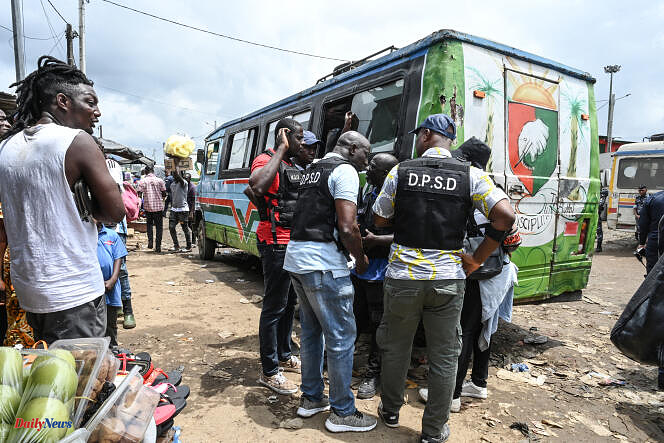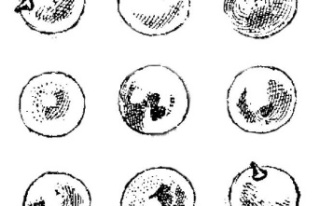The twisted trial of international cocaine trafficking resumed this Thursday, March 14 at the economic and financial center of Abidjan. It is the turn of Hussein Taan to appear, owner of two well-known establishments in Abidjan: the bakery-pastry shop Des Gâteaux et du Pain, and the Italian cuisine restaurant Pasta e Pizza. The Franco-Ivorian businessman of Lebanese origin faces separate charges of international drug trafficking and tax evasion.
Unlike the majority of his co-defendants, the one who takes the stand does not wear the bib of prisoners at the Abidjan Detention and Correction Center (MACA): he is on conditional release. Hussein Taan looks casual, in a black t-shirt and pants, and a pair of matching Adidas sneakers. He does not recognize the facts with which he is accused, he declares to the president of the court. No, he is not aware of the seizure of two tons of cocaine in San Pedro in April 2022. No, he does not know Miguel Angel Devesa Mera, accused of being the mastermind of the network, nor his alleged accomplice Marcelle Akpoue .
The prosecutor stands up. She announced that “images and data linked to cocaine trafficking were found in the phone” of Hussein Taan. And more particularly in discussions held on WhatsApp groups, one of which is aptly titled… “Cartel”. “It’s “Quartel”, with “QU”!, corrects Hussein Taan, who specifies that it is a play on words with “Quartier”. “It’s just a group with some childhood friends. For gossip! » The prosecutor contradicts him: “We nevertheless found messages talking about drugs! » While she declines their reference in the investigation file, the lawyers lose their temper: they have just noticed that several documents are missing from the file which was delivered to them. The hearing is suspended, the magistrates take the dispute behind the scenes.
Wads of euro notes
Upon resumption, the prosecutor agrees to read the compromising messages. The first was sent by a friend of Hussein Taan in 2017, in which he claimed to sell cocaine. “Husco [the defendant’s nickname], you have lots of relatives who are big consumers,” he says, before offering to “give them prices”. Hussein Taan asks to know his own response to this proposal, but the prosecutor ignores it. The file does not include the rest of the conversation. “It’s still strange,” quips one of the lawyers. Do your friends tell you they're selling drugs and offer to give your loved ones a price, while you're actually dealing drugs yourself? »
The prosecutor then reviews a second WhatsApp group, reserved for the Taan family. It is a photograph that is in question: a small package in a black bag, tightly sealed with adhesive strips. A “suspicious condition”, announces the prosecutor, who calls on the accused to explain himself. These are bundles of euro notes, according to Hussein Taan. “In July 2020, my grandmother caught Covid-19 and became seriously ill in France. She had to be placed in intensive care, but was not attached to Social Security,” he emphasizes.
The defendant, called for help, sent 30,000 euros, using an informal international transfer system called “awala”, often practiced between Paris and Abidjan. He thus gives the sum in CFA francs to an Ivorian intermediary, after which a Parisian correspondent delivers the equivalent in euros, packaged in the black bag, to the Taan family. The defense reads the messages preceding and following the sending of the photograph, which appear to confirm the accused's version. “I have never talked about drugs in any WhatsApp group,” exclaims Hussein Taan. And even less so to my parents! »
The court continues with the restaurant Pasta e Pizza, which also appears on the list of accused, and with which two men are associated, the brothers Antonio and Bartolo Bruzzaniti. Former regulars of a café managed by Hussein Taan, specifies the defendant, where the three men formed bonds around their common love for pizza. “I made them taste mine, which didn’t convince them,” says the Franco-Ivorian. But when they let me taste theirs, I was won over and we decided to open a restaurant together in 2016.”
Tax fraud?
However, Bartolo Bruzzaniti is an alleged member of the Calabrian 'Ndrangheta mafia and is allegedly involved in international cocaine smuggling operations. Hussein Taan swears to have ignored him throughout their collaboration. The creation of Pasta e Pizza was also finalized with a notary, he explains, where the partners had to produce a criminal record extract. That of the Bruzzaniti brothers was blank. Wanted since 2022 by Italian authorities on the basis of an Interpol red notice, Bartolo Bruzzaniti was arrested in Lebanon in 2023 and extradited to Italy, where his brother Antonio Bruzzaniti was also arrested. The two men, awaiting a judgment, affirmed before the Italian courts that the Franco-Ivorian had nothing to do with their activities.
As for Miguel Angel Devesa Mera, it was through telephone triangulation that the Ivorian police linked him to Hussein Taan. The defendant's smartphone was once near that of Miguel Angel Devesa Mera in Zone 4, another time near that of Marcelle Akpoue. A lawyer for Hussein Taan points out that the triangulation technique has an accuracy of 300 meters, which appears insufficient to prove that a meeting actually took place between the defendants. Called successively to the stand, Miguel Angel Devesa Mera and Marcelle Akpoue both confirm that they do not know Hussein Taan. In a previous hearing, Mr. Devesa Mera also announced that he had never associated himself with the Bruzzaniti brothers.
Hussein Taan must finally answer to a charge of tax evasion, even if the link with drug trafficking in San Pedro is not revealed by the court. The accusation relates to his association with another defendant, the Italian Maurizio Cocco, building engineer and geologist. He is Mr. Taan’s “contractor,” the latter explains, who commissioned him to build a house. Hussein Taan thus paid him 40 million CFA francs, in several installments, over a period of eight months. The prosecutor questions him about these cash payments and deplores a lack of traceability, pointing to the risk of fraud. In the audience, a defense lawyer laughs softly: “For provisional release, we paid part of the bail in cash…”
But there is no complaint from the tax administration, points out the defense, which has already twice requested the cancellation of these proceedings. “What taxes would you not have paid?,” one of the lawyers pretends to ask. What amounts would be owed? Concretely, what are you accused of? » “Very frankly,” concludes Hussein Taan, “I myself would like to understand it…” The hearings will resume on Thursday March 21.












